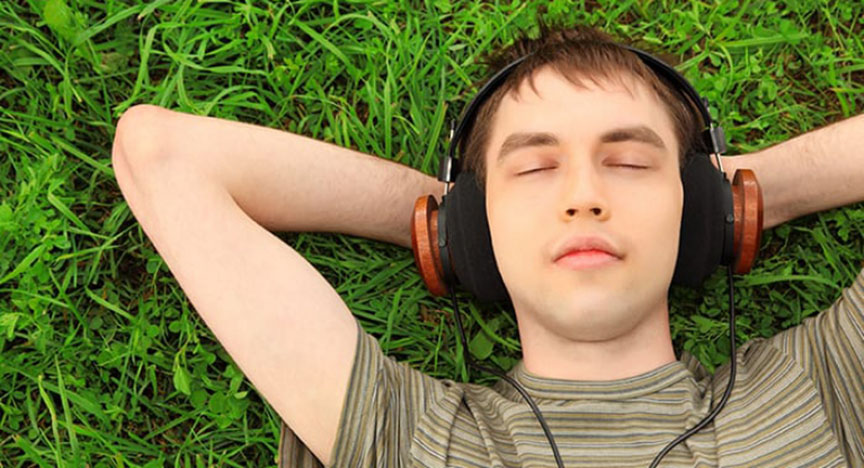
Music can play a major part in a young person’s life and music therapists have long been tuned in to its powers to help with physical recovery and mental wellbeing. For young people, the music they choose to play and/or listen to can help them express themselves, feel understood, and identify and manage emotions on a daily basis. It can give them their own special space, and a sense of connection with others.
This is particularly important for young people experiencing mental health difficulties, as they often feel isolated or alone in their struggles. Music can provide a comforting cocoon where they feel heard and can consider their own situation and make sense of it. Or it can provide a distraction from something problematic and upsetting, and potentially make them feel better.
The link between music and moods
Express yourself
Songs can be a way for a young person to express and work through difficult times. Using words from a favourite song can help them to describe a story, experience, thoughts or feelings that relate to them. Song writing can also be a creative way to express emotions, which can be a liberating experience.
The rhythm of life
Almost everyone has a ‘go to’ song that matches their current mood. A favourite song can create the right kind of atmosphere, whether it’s getting ready for a night out, playing sport or studying. Music can also intensify strong emotions, such as falling in or out of love, anger or sadness.
Come together
Participating in a music group can be motivating and inspiring for young people, making them feel like they are a part of something bigger. It gives them a sense of achievement, encourages positive thoughts about themselves and their future. Musical experiences and expressions provide valuable ways to grow, develop and enjoy life during teenage years, which has beneficial results in adulthood. When a young person feels positive and valued by what they do, and that they are part of a community, they also feel good about themselves.
“Music finds and moves the big, invisible moving pieces in our hearts and helps us figure out the position of things inside us.” (Karl Paulnack, musician and Dean of Ithaca School of Music, 2004)
When the going gets tough
Because music can be so powerful at engaging emotions and providing a comforting space to withdraw to, it can also be a tool for reinforcing negative feelings or personal isolation. For example, a young person will be naturally drawn to sad music when they are in a sad mood. At times, this may be helpful in allowing them to process a challenging life experience but it has the potential to keep a young person stuck in that negative space. Some young people may not be aware that their music choices are impacting them negatively, and they can begin to spiral. They might also use music as a way to isolate themselves and avoid problems. As a result, they may not ask for help when they need it, or may avoid addressing an important issue impacting their lives.
Be in tune with your child’s musical mindset
Music is a sensitive topic for young people because it reflects their inner world.
It is important to be able to identify your child’s mood based on the music they are listening to. This is especially important when helping young people who struggle with mental health issues, as these challenges are not visible on the body in the way that physical health issues are.
Put some safety planning into place by having a conversation with your child when they are feeling relaxed. Talk to them about what it means to them when they play particular songs. It can be very helpful to have specific songs that signify “I’m not OK but I am safe” and “I am not OK, please check up on me”. If your child is playing a song that signifies they are crying for help, allow some time to pass, but not too much, and calmly approach them and ask if they are OK. If they are showing signs that their emotional wellbeing or mental health is at risk, check in with your general practitioner (GP) and they will refer you to the appropriate service.
Parents can connect with their children through music by:
- Going to concerts together – this is a great way to form a connection and create positive memories.
- Being curious about why particular songs are important and why it interests them.
- Encouraging them to learn a musical instrument for fun and not just for academic pursuit.
- Playing your favourite music/artist/band to them from a young age. This can create positive connections and can give you something in common.
When should I seek help for my child?
If you are concerned about the mental health and emotional wellbeing of your child, speak to your general practitioner (GP). The following signs could be a cry for help.
- Spending a lot of time with headphones and becoming more isolated or withdrawn.
- Listening to the same music repetitively (10 times a day or more). Ask your child what this music means to them.
- Prolonged change in behaviour – no longer being happy and bubbly, and becoming moody or sad.